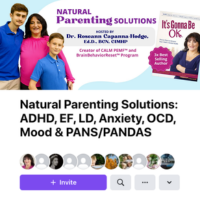This is a 3-Part Series on Improving Parent-Child Communication
Why Parent and Child Communication Breaks Down
What Should I Do When Communication Is Broken Down With My Teen or Child?
Improving communication between parents and their children or teens is essential for creating strong and supportive relationships. Regardless of parenting style, when parents and children communicate effectively, it promotes mutual understanding, builds trust, and helps to resolve conflicts in a positive manner.
Effective communication can also support the healthy development of children and teenagers and encourage them to make informed and responsible decisions. By fostering open and honest communication, parents can help to create a positive family environment that benefits everyone. Improved communication can also reduce stress and increase happiness, promoting a sense of belonging and connectedness between parents and teens.
Making an effort to improve communication between parents and children is a crucial step in building strong and supportive relationships that will last a lifetime. By listening actively, being respectful, and communicating openly, parents and children can create a relationship that is based on trust, understanding, and mutual support.
Reasons Why Parent and Child Communication Breaks Down
In today’s stressful world, it is pretty easy for communication to break down between parents and their children, with each “side” feeling frustrated, angry, and hopeless. It is important to remember that communication can always be repaired when a parent is willing to speak in a way that kids can “hear.”
That means listening and communicating so your child will be more able to “hear” and understand you. Talking with your child has to be a priority, and when your child has clinical issues such as ADHD, ASD, dyslexia, anxiety, mood disorder, OCD, or other conditions, it can be more complex.
There are many reasons why communication breaks down between a parent and child or teenager, but ultimately an impasse can really cause serious damage to a parent-and-child relationship. A child can feel frustrated by their own lack of skills and give up, and parents can feel confused and irritated.
You want your child to feel safe and trust you with little things so they can come to you with big issues too. It also can set the stage for future communication issues during times when your child really needs you.
For example, if they were in a crisis or trouble, they might be afraid to come to you, and you might not know until it's too late. You will really see the value of this when communicating with your teen during normal developmental periods.
Your body language, tone of voice, and eye contact all contribute to getting your child or teen to talk more openly with you. As your child grows, being mindful of these factors will stop communication breakdowns.
Benefits of Healthy Communication Between Parents and Teenagers or Children
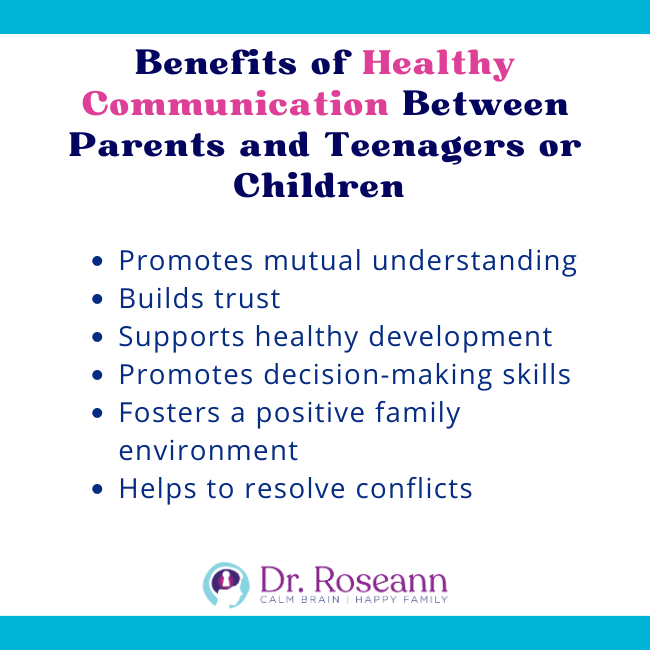
Cultivating healthy communication between a child and parent is a garden that needs constant tending. And, of course, when you do, the garden blooms and is bountiful. Good communication doesn’t just happen. Parents need to shape healthy conversations and emotional development by role modeling it and to constant engage with their children and teens.
Healthy communication skills don't just benefit your child today but will throughout their entire life and with future generations.
Promotes mutual understanding:
Improved communication can help parents and teens to better understand each other's perspectives and feelings. This can reduce misunderstandings and conflicts and create a more supportive and positive environment for both parents and teens.
Builds trust:
When parents and teens communicate openly and honestly, it helps to build trust and strengthens the relationship. This trust can be especially important during the teenage years when teens are exploring their independence and may need to confide in their parents.
Supports healthy development:
Effective communication is crucial for supporting teenagers as they navigate the challenges and opportunities of adolescence. Improved communication can help teens feel heard and understood, which can promote their self-esteem, resilience, and overall well-being.
Promotes decision-making skills:
By encouraging teens to communicate their thoughts and feelings, parents can help to develop their decision-making skills, encourage independent thinking and promote emotional regulation. This can help kids and teens to make informed and responsible choices in the future.
Fosters a positive family environment:
When communication is strong, it can create a positive and supportive family environment that benefits everyone. Improved communication can help to reduce stress, increase happiness, and create a sense of belonging for all family members.
Helps to resolve conflicts:
When conflicts arise, effective communication can help to resolve them in a constructive and respectful manner. This can reduce feelings of anger, frustration, and resentment, and help to maintain a positive relationship between parents and teens.
Improving parent-child communication is essential for building strong and healthy relationships, supporting healthy development, and fostering a positive family environment. By making an effort to communicate openly, listen actively, and be respectful, parents and children or teens can build relationships that are based on trust, understanding, and mutual support.
15 Tips for Communicating With Your Child or Teen
Kids don’t just develop skills, and sometimes the skills are there, and a child or teen faces a mental health crisis such as PANS/PANDAS or OCD, and they regress. They won’t just magically appear on their own and often need direct intervention. The good news is that with consistent reinforcement and conscious effort, communication can improve within a family unit.
Lucas was a typical kid until he developed PANS/PANDAS at age ten, and then he became full of rage seemingly overnight. Lucas was lucky that he got treatment quickly, and most of his symptoms went away, but a lingering issue was poor communication and low frustration tolerance.
After using CALM PEMF™, Lucas was much more regulated and was handling frustrating situations like a champ! Family communication was still not what it was, so his parents joined our CALM Brain Group and learned and implemented family communication strategies that made a difference.
1. Active Listening: Pay attention to your child or teenager when they talk and show interest in what they are saying. Ask questions to clarify and understand their point of view.
2. Avoid criticism: Instead of criticizing, offer constructive feedback that helps your child or teenager see the positive aspects of their behavior while suggesting ways to improve.
3. Set clear boundaries: Clearly communicate your expectations and consequences for behavior. This helps your child or teenager feel secure and understood.
4. Validate their feelings: Let your child or teenager know that you understand how they are feeling, even if you don't agree with their behavior. This helps to build trust and respect.
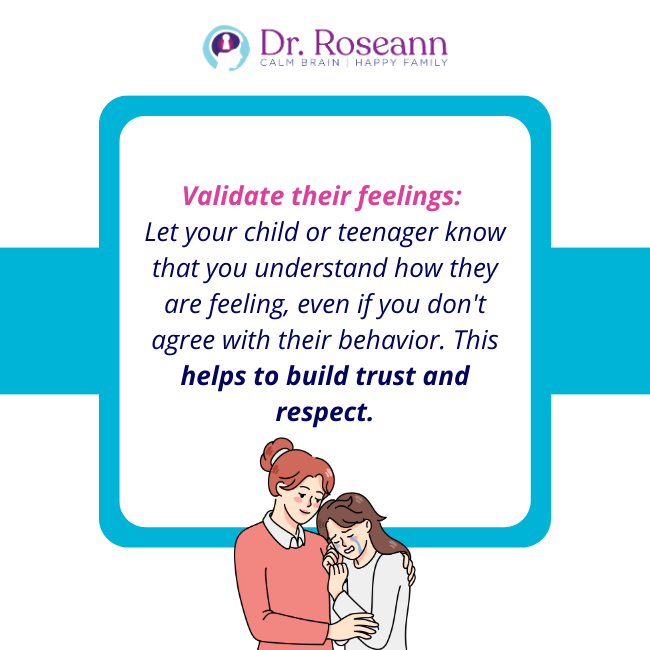
5. Use “I” statements: Instead of blaming or accusing your child or teenager, use “I” statements that express your own feelings and needs. This helps to avoid arguments and promotes understanding.
6. Be patient: Communication with a child or teenager can be challenging, so it's important to be patient and persistent. Take breaks if needed, but keep trying to understand and connect with them.
7. Respect their opinions: Encourage your child or teenager to express their opinions, even if they are different from your own. This helps to promote critical thinking and problem-solving skills.
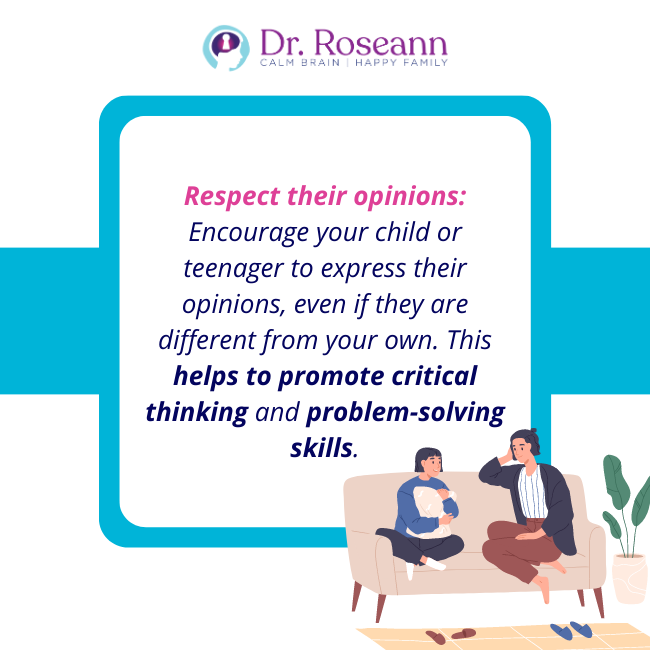
8. Avoid distractions: Turn off your phone or any other distractions and give your child or teenager your full attention. This helps to show that you value and respect their communication.
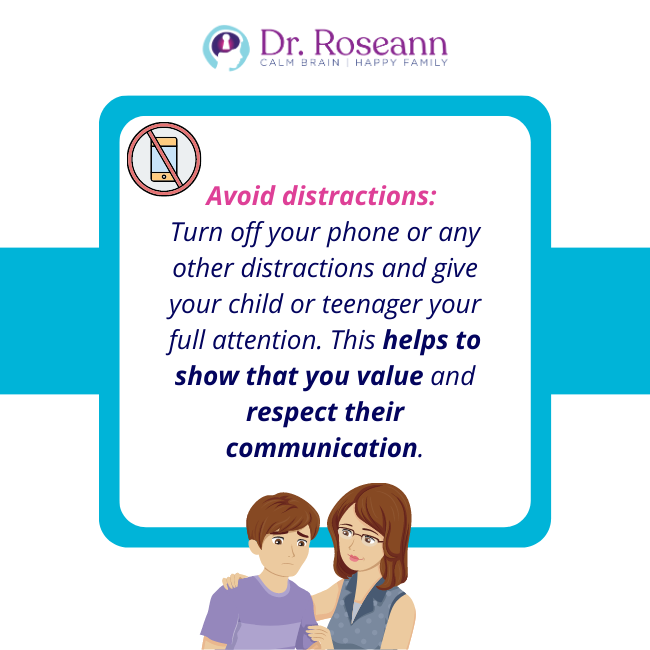
9. Lead by example: Children and teenagers learn how to communicate by watching those around them. Model good communication skills by speaking respectfully, listening actively, and avoiding criticism.
10. Create opportunities for open dialogue: Encourage open and honest communication by creating opportunities for regular, one-on-one conversations. This can be through a weekly family dinner, a walk, or even a car ride.
11. Show empathy: Try to understand your child or teenager's perspective and feelings. Show empathy and put yourself in their shoes to help build trust and strengthen your relationship.
12. Avoid ultimatums: Instead of using ultimatums, try to find a mutually beneficial solution to a problem. This helps to promote cooperation and understanding.
13. Use humor: Humor can be a great way to diffuse tense situations and create a relaxed atmosphere. However, be careful not to make fun of your child or teenager or their feelings.
14. Be consistent: Consistency is key when it comes to communication with children and teenagers. Follow through on promises and consequences, and maintain clear boundaries and expectations.
15. Encourage positive communication: Encourage your child or teenager to communicate positively rather than using negative language or sarcasm. This helps to build a positive and respectful relationship.
Effective and healthy communication with your child or teenager requires effort, patience, and a willingness to understand and be understood. By following these tips, you can foster a positive and healthy relationship and help your child or teenager develop strong communication skills that will serve them well into adulthood.
Even when you feel your communication is completely broken down with your teenager, there are things you can do to repair the relationship. Having patience and calming your own nervous system is key to creating a shift that repairs the relationship.
If your child has a clinical issue such as ADHD, getting ADHD help can give your child’s brain the self-regulation skills not only for communication but for task completion and memory too.
Citations:
Camacho-Thompson, D. E., Gillen-O'Neel, C., Gonzales, N. A., & Fuligni, A. J. (2016). Financial Strain, Major Family Life Events, and Parental Academic Involvement During Adolescence. Journal of youth and adolescence, 45(6), 1065–1074. https://doi.org/10.1007/s10964-016-0443-0
Hollmann, J., Gorges, J., & Wild, E. (2016). Motivational antecedents and consequences of the mother–adolescent communication. Journal of Child and Family Studies, 25(3), 767–780. https://doi.org/10.1007/s10826-015-0258-8
Wymbs B. T. (2011). Mechanisms underlying the influence of disruptive child behavior on interparental communication. Journal of family psychology: JFP: journal of the Division of Family Psychology of the American Psychological Association (Division 43), 25(6), 873–884. https://doi.org/10.1037/a0025372
Wymbs, B. T., & Pelham, W. E. (2010). Child effects on communication between parents of youth with and without attention-deficit/hyperactivity disorder. Journal of abnormal psychology, 119(2), 366–375. https://doi.org/10.1037/a0019034
Always remember… “Calm Brain, Happy Family™”
Are you looking for SOLUTIONS for your struggling child or teen?
Dr. Roseann and her team are all about solutions, so you are in the right place!
There are 3 ways to work with Dr. Roseann:
You can get her books for parents and professionals, including: It’s Gonna Be OK™: Proven Ways to Improve Your Child’s Mental Health, Teletherapy Toolkit™ and Brain Under Attack: A Resource For Parents and Caregivers of Children With PANS, PANDAS, and Autoimmune Encephalopathy.
If you are a business or organization that needs proactive guidance to support employee mental health or an organization looking for a brand representative, check out Dr. Roseann’s media page and professional speaking page to see how we can work together.
Dr. Roseann is a Children’s Mental Health Expert and Therapist who has been featured in/on hundreds of media outlets including, CBS, NBC, FOX News, PIX11 NYC, The New York Times, The Washington Post,, Business Insider, USA Today, CNET, Marth Stewart, and PARENTS. FORBES called her, “A thought leader in children’s mental health.”

She is the founder and director of The Global Institute of Children’s Mental Health and Dr. Roseann Capanna-Hodge. Dr. Roseann is a Board Certified Neurofeedback (BCN) Practitioner, a Board Member of the Northeast Region Biofeedback Society (NRBS), Certified Integrative Medicine Mental Health Provider (CMHIMP) and an Amen Clinic Certified Brain Health Coach. She is also a member of The International Lyme Disease and Associated Disease Society (ILADS), The American Psychological Association (APA), Anxiety and Depression Association of America (ADAA) National Association of School Psychologists (NASP), International OCD Foundation (IOCDF) International Society for Neurofeedback and Research (ISNR) and The Association of Applied Psychophysiology and Biofeedback (AAPB).
© Roseann-Capanna-Hodge, LLC 2023
Disclaimer: This article is not intended to give health advice and it is recommended to consult with a physician before beginning any new wellness regime. *The effectiveness of diagnosis and treatment vary by patient and condition. Dr. Roseann Capanna-Hodge, LLC does not guarantee certain results.




